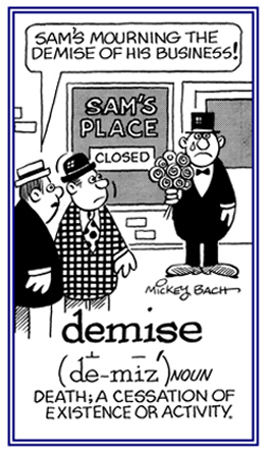2. In law, the transfer of an estate by lease or will: James, the landlord, demised his property to his son, including his control over it.
3. The transfer of a ruler's authority by death or abdication: The crown was demised to the queen's heir, the prince, after she died.
4. Etymology: from about 1442, from Middle French (c.1400 to c.1600) demise, past participle of demettre, "to dismiss, to put away"; from des-, "away" (from Latin dis-) + Middle French mettre "to put"; from Latin mittere "to let go, to send".
It originally meant "the transfer of an estate by [means of a] will"; and the meaning was extended in 1754 to "death" because that's when the transfer happened.
The demise of "Dear"
Here is a change in common usage that offers a linguistic clue to a cultural change which has resulted from electronic mail (e-mail) usage.
This presentation is about the threatened abandonment of the symbolic embrace inherent in an old Teutonic word: Dear! The application of "Dear" came into existence about a thousand years ago meaning "honorable, worthy", and then it took on the sense of "esteemed, valued" and ultimately "beloved", gaining a sense of "high-priced" along the way.
Back in the time of the "quill pen", the word was used as a polite form of address in introducing a message to a friend or to a stranger and establishing status to a superior, an employee, or an equal.
Now, in the age of instant messaging and e-mail, the compressors of personal communication have been doing away with the word traditionally used in salutation. Instead of using Dear, the e-generation often starts off either with no greeting, the first name, Hello Name, Hi Name, etc.
Apparently, the internet is now considered to be an informal means of communication and so it is no longer necessary to use a particular form of greeting; as long as it isn't replaced with some form of rudeness.


